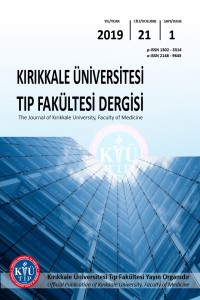Abstract
Hipofiz sapı
kesilme sendromu (HSKS), hipofiz glandının nadir bir konjenital anomalisidir. HSKS
pituiter stalk yokluğu veya ince olması, ektopik posterior hipofiz glandı ve hipoplastik
veya aplastik anterior hipofiz glandı triadı ile karakterize bir antitedir. Klinik
olarak ortaya çıkışı hormonal eksikliklerin derecesine bağlıdır ve semptomlar yaşa
bağlı olarak değişiklik göstermektedir. Bu izole büyüme hormonu eksikliği olabileceği
gibi multipl ön hipofiz hormon yetmezliği olarak da karşımıza çıkabilmektedir. Bu
sendrom hipofizer yetmezlik olan çocukların değerlendirilmesinde manyetik rezonans
görüntülemenin yaygın kulanımı sonrası tanımlanmıştır. Manyetik rezonans görüntülemenin
kullanımı ile hastalığın erken tanısı kolaylaşmıştır. Erken tanı ve tedavi ile bu
nadir hastalığın boy kısalığı gibi kalıcı etkileri önlenebilir. Bu yazıda, boy kısalığı
ve gecikmiş puberte şikayeti olan üç olgu, manyetik rezonans görüntüleme (MRG) bulguları
ile birlikte sunulmuştur.
Keywords
References
- 1. Gutch M, Kumar S, Razi SM, Saran S, Gupta KK. Pituitary stalk interruption syndrome: Case report of three cases with review of literature. J Pediatr Neurosci. 2014;9(2):188-91.
- 2. Ram N, Ali SA, Hussain SZ. Pituitary stalk interruption syndrome presenting as short stature: a case report. J Med Case Rep. 2014;8:445. Doi: 10.1186/1752-1947-8-445.
- 3. Fujisawa I, Kikuchi K, Nishimura K, Togashi K, Itoh K, Noma S et al. Transection of the pituitary stalk: Development of an ectopic posterior lobe assessed with MR imaging. Radiology. 1987;165(2):487-9.
- 4. Kan EK, Ecemiş GC, Bahadır ÇT, Atmaca H. Hipofiz sapı kesilme sendromu: Üç olgu sunumu. Türkiye Klinikleri J Case Rep. 2014;22(2):112-6.
- 5. Guo Q, Yang Y, Mu Y, Lu J, Pan C, Dou J et al. Pituitary stalk interruption syndrome in Chinese people: Clinical characteristic analysis of 55 cases. PLoS One. 2013;8(1):e53579.
- 6. Pinto G, Netchine I, Sobrier ML, Brunelle F, Souberbielle JC, Brauner R. Pituitary stalk interruption syndrome: a clinical-biological-genetic assessment of its pathogenesis. J Clin Endocrinol Metab. 1997;82(10):3450-4.
- 7. van der Linden AS, van Es HW. Case 112: pituitary stalk transection syndrome with ectopic posterior pituitary gland. Radiology. 2007;243(2):594-7.
Abstract
Pituitary stalk
interruption syndrome (PSIS) is a rare congenital abnormality of the pituitary gland.
PSIS is an entity that is characterized by thin or absent
pituitary stalk, ectopic posterior pituitary and hypoplastic or aplastic anterior
pituitary gland triad. Clinical presentation depends on the extent of the hormonal
deficiencies and symptoms vary according to age. PSIS is associated with various
pituitary endocrin deficiencies, which may be isolated growth hormone deficiency
or multiple anterior pituitary hormone deficiencies. This syndrome was defined after
the widespread use of magnetic resonance imaging in the evaluation of children with
pituitary insufficiency. Early diagnosis of the disease was facilitated by the use
of magnetic resonance imaging. With early diagnosis and treatment, permanent effects
such as short stature of this rare disease can be prevented. In this report, three
cases with short stature and delayed puberty were presented with magnetic resonance
imaging (MRI) findings.
References
- 1. Gutch M, Kumar S, Razi SM, Saran S, Gupta KK. Pituitary stalk interruption syndrome: Case report of three cases with review of literature. J Pediatr Neurosci. 2014;9(2):188-91.
- 2. Ram N, Ali SA, Hussain SZ. Pituitary stalk interruption syndrome presenting as short stature: a case report. J Med Case Rep. 2014;8:445. Doi: 10.1186/1752-1947-8-445.
- 3. Fujisawa I, Kikuchi K, Nishimura K, Togashi K, Itoh K, Noma S et al. Transection of the pituitary stalk: Development of an ectopic posterior lobe assessed with MR imaging. Radiology. 1987;165(2):487-9.
- 4. Kan EK, Ecemiş GC, Bahadır ÇT, Atmaca H. Hipofiz sapı kesilme sendromu: Üç olgu sunumu. Türkiye Klinikleri J Case Rep. 2014;22(2):112-6.
- 5. Guo Q, Yang Y, Mu Y, Lu J, Pan C, Dou J et al. Pituitary stalk interruption syndrome in Chinese people: Clinical characteristic analysis of 55 cases. PLoS One. 2013;8(1):e53579.
- 6. Pinto G, Netchine I, Sobrier ML, Brunelle F, Souberbielle JC, Brauner R. Pituitary stalk interruption syndrome: a clinical-biological-genetic assessment of its pathogenesis. J Clin Endocrinol Metab. 1997;82(10):3450-4.
- 7. van der Linden AS, van Es HW. Case 112: pituitary stalk transection syndrome with ectopic posterior pituitary gland. Radiology. 2007;243(2):594-7.
Details
| Primary Language | Turkish |
|---|---|
| Subjects | Health Care Administration |
| Journal Section | Case Reports |
| Authors | |
| Publication Date | April 30, 2019 |
| Submission Date | July 30, 2018 |
| Published in Issue | Year 2019 Volume: 21 Issue: 1 |
Cite
This Journal is a Publication of Kırıkkale University Faculty of Medicine.


